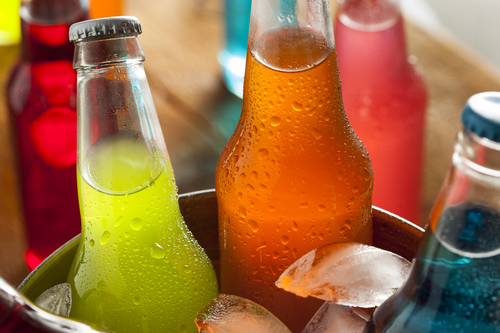
The truth is, almost everyone is consuming too much sugar because of the way this sweet ingredient is added into almost every food and beverage out there. Sugar makes foods taste better, which makes it a common additive in many packaged products. Because sugars presence isn’t always easily detected, it can be easy to consume far more sugar than what is recommended.
We’ve created the ultimate hidden sugar breakdown so you can help to keep your intake at a minimum, and keep your teeth cavity free.
Surprisingly Sugary Drinks
Unless you’re only hydrating your body with water, there’s more than likely sugar listed as an ingredient on your beverage of choice. Some drinks that market themselves as “healthy” or “low calorie” are sometimes just as bad for your teeth as a can of soda. Be conscious of the drinks you choose to incorporate in your daily lifestyle and check the ingredients label for how many grams of sugar a drink contains before you consume.
Top Hidden Sugar Culprits
Smoothies and fruit juices
Fruit contains fiber, which helps show the absorption of sugar into the bloodstream. When you juice or blend whole fruit, that fiber is broken down and the sugar hits you all at once. If your smoothie or juice contains any fruits that are high in acidity, those drinks are causing extra tooth decay to your tooth enamel.
Yogurt
You may think you’re doing something healthy for your body by eating yogurt, but unless you’re only eating plain yogurt, your fruit flavored selection can have as much as 19 grams of sugar per container, which is almost the recommended daily consumption amount of 25 grams all from your breakfast.
Fast food
You probably already know that fast food typically is not a healthy choice when it comes to supplying your body with nutrients that it needs to thrive. Takeout and fast food have added sugars in nearly every component.
Pastas with red sauces
Pasta is a complex carbohydrate which always contains sugars and marinara sauces contain added sugars and also high levels of acidity from tomatoes. This cheap, easy meal can quickly cause havoc on your blood sugar and your teeth.
Dried fruits
The process of drying fruit concentrates the sugars and decreases the nutritional value. It’s said that eating a piece of dried fruit is equivalent to eating a piece of candy when it’s broken down.
Granola bars
Like dried fruit, granola may seem like a healthy alternative to candy or other processed snacks, but once again that’s just not the case. Processed bars tend to be extremely high in sugar.
Energy drinks
You’re probably already aware that energy drinks aren’t good for you on a nutrition level. Filled with sugars and high levels of acidic make these caffeine boosters terrible for your teeth and will leave you with a crash effect once the sugars have worn off.
Why It’s Best to Reduce Juice
Juice may seem like an innocuous drink to give to your children to keep them hydrated, but fruit juices can have significant negative impact on a child’s health and offers little to no nutritional evidence.
Studies performed over the last few years have led experts to state that juice is one of the biggest causes of dental erosion for children’s teeth, and can be connected to childhood obesity.
Restrict juice consumption for your child by following this general guideline from the American Academy of Pediatrics:
- Children under 12 months should not consume fruit juice
- Toddlers (ages 1-3) – No more than 4oz of fruit juice daily
- Children (ages 4-6) – No more than 4-6oz of fruit juice daily
- Adolescent and Teens (ages 7+) – No more than 8oz of fruit juice daily
How to Drink Responsibly
If you are going to consume a beverage that contains sugar, you should always:
- Use a straw to limit the amount of liquid that touches your teeth
- Rinse your mouth with water after you’re finished
- Pair drinks with meals so your body’s natural defense of saliva is at its peak to help sugars from sticking to your teeth
Always make sure to schedule regular dental checkups for yourself and your children so we can help to give you feedback on whether your family’s diet contains too much sugar and is having a negative impact on your teeth.